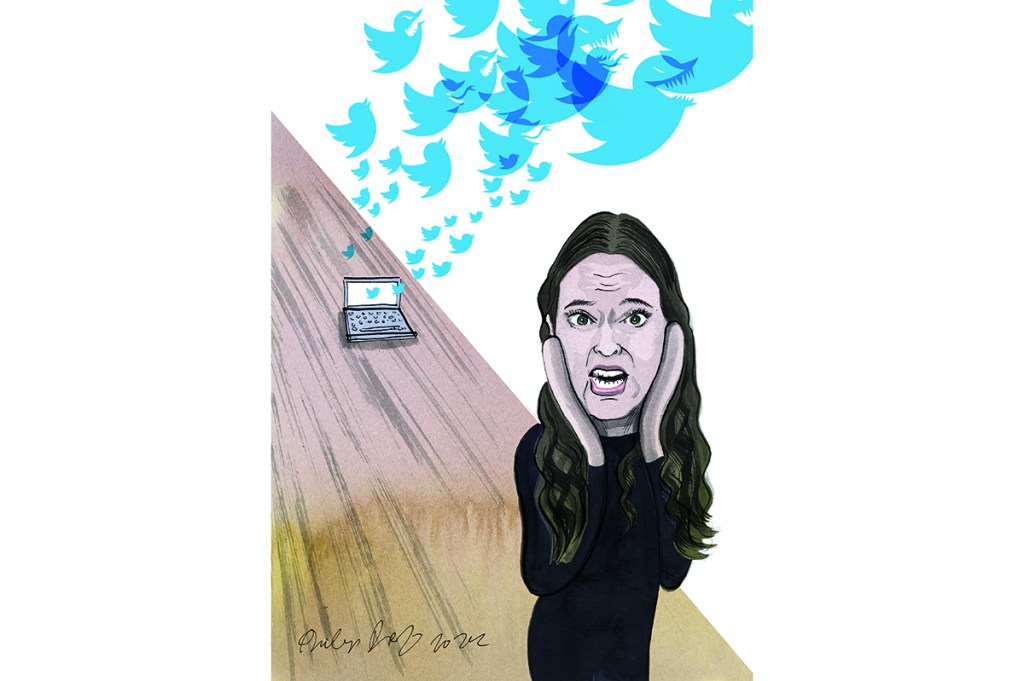The Washington Post is one of America’s most revered news organizations. Once led by Katharine Graham, an era-defining media CEO, and edited by news legend Ben Bradlee, the Post is famous for the Watergate-era journalism of Bob Woodward and Carl Bernstein, which made it the nation’s political paper of record.
Today, one of the Post’s most high-profile employees is an internet-culture reporter named Taylor Lorenz. Her involvement in numerous scandals involving reporting errors, frequent falsehoods, violations of journalistic norms and troubling online interactions call into question whether outlets like the Post can continue to function effectively as the Fourth Estate in the age of online clout-chasing and click-based news.
A former social-media manager and marketer, Lorenz is credited with carving out a new kind of internet-focused journalism that made social media culture a topic for serious coverage. Upon hiring her earlier this year, the Post called Lorenz the “country’s premier chronicler of internet culture.” But Lorenz, who declined to be interviewed for this article, has also become a lightning rod whose Wikipedia “controversies” section is as long as the rest of the entry.
Lorenz’s repertoire of run-ins is as broad as it is deep. She has falsely accused tech pioneer Marc Andreessen of “openly [using] the r-slur” (“retard”) on audio app Clubhouse; attacked female entrepreneur Steph Korey, who spoke out on Instagram against the media’s negative coverage of female brand-founders, as “ranting” and “disgraced”; accused Balaji Srinivasan, a crypto innovator and thought leader who defended Korey, of attacking Lorenz “for months” despite the fact that searches show Srinivasan had tweeted about Lorenz roughly twice prior to the Korey episode; and doxxed a woman behind a prominent Twitter account by linking to her personal information in an article.
More recently, after a highly public spat with her former New York Times colleague, Maggie Haberman, Lorenz reportedly called Haberman a “psycho” and a “bitch” on an internal Times messaging system — all over a debate on whether journalists should have personal “brands.” Lorenz again made headlines when she tweeted that she had been “relentlessly” harassed by an editor from news super-aggregator the Drudge Report who, she alleged, threatened to ruin her career. Matt Drudge, a famously reclusive figure, personally contacted Lorenz directly to clarify that he “never contacted her, nor has anyone associated with Drudge Report,” CNN reported.
This spring, Lorenz caused a major journalistic dust-up by claiming she had reached out to two prominent YouTube creators for a Post article about content creators making videos related to the Johnny Depp-Amber Heard trial. When both creators said they had never been contacted, Lorenz attempted to rewire the sequence of events, saying she had contacted the creators after the story went live. An editor’s note, the journalistic equivalent of a red card in soccer, was added to the piece which contradicted Lorenz’s account of what happened.
Lorenz’s pattern may not be on a par with the journalistic sins of figures like Jayson Blair and Stephen Glass, media darlings outed for fabricating and plagiarizing stories. But unlike Blair or Glass, both of whom were fired when caught, Lorenz is still sitting on one of the loftiest perches in the American media after breaching her trade’s established standards and norms.
Lorenz seems to be surrounded by a force field that protects her from ordinary journalistic scrutiny. This extends to her much-vaunted “brand,” which she’s building with her own Substack (an arrangement almost unprecedented for a full-time journalist at a major publication) and on TikTok, where she posts influencer-like clips of herself reflecting on… well, herself. This devotion to TikTok, which borders on the slavish, might derive from the fact that, with 500,000 followers, she is invested in the significance and, to an extent, the success of the platform. But where Lorenz’s reporting portrays every other platform as part of a dangerous web of misinformation run by ruthless tech barons, TikTok (owned by a Chinese company whose ties to China’s government have been widely questioned) needs to be “understood.”
All this raises broader questions not just about the kind of journalism being produced by elite outlets like the Post, but the cultural environment that keeps news audiences more engaged by battles for “clout” and social media status than hard news. As journalism has increasingly played out on Twitter, where reporters attract attention not only to themselves but (as their employers have noticed) bring valuable clicks to their articles, online conflict has become a kind of commodity. In this arena, Lorenz is an innovator who’s learned to mine new sources of outrage and attention by crusading against the ethically unenlightened.
It might be this internecine warfare that has led Lorenz to loudly describe herself as a victim of ever-shifting forces of persecution, despite her appetite for engaging in conflict in the public spotlight. She has repeatedly alleged that she’s a victim of grave violations of her privacy, including in a teary appearance on MSNBC (after which she slammed the network, saying it had “f–ed up royally” when the segment led to ridicule of her online). But this charge, invasion of privacy, is the very same one leveled against Lorenz herself by numerous subjects of her articles or targets of her Twitter attacks.
“I think the term is crybully,” says a prominent tech leader with a major online following. This person says that Lorenz will attack you in “the harshest, most defamatory terms possible” but the moment you defend yourself she cries victim. The person compares Lorenz’s campaigns, which mobilize thousands of social media followers (she has over a million across platforms) as well as powerful allies like New York magazine contributor Yashar Ali, to sending a SWAT team for an unpaid parking ticket.
“I want to make clear I do respect what [Lorenz] has accomplished, immensely, in terms of turning the tech-culture beat into what it deserves to be,” says Christie Smythe, a journalist who serves as editor in chief of the Business of Business, a business news site. “But I’ve also had interactions with her that might suggest to me that there is credence to the criticism.”
In the spring of 2021, Smythe came across the story of Ariadna Jacob, a pioneering young talent agent who signed many of TikTok’s biggest influencers months before they became household names. In August 2020, Jacob was the subject of a lengthy New York Times takedown by Lorenz which made numerous allegations, including that Jacob had failed to pay the influencers she represented and deliberately leaked nude photos of one member of the group — a claim Lorenz, from her emails to Jacob, seemingly knew to be false.
“Initially I thought Ariadna was just someone who had a negative story written about her in the Times and has an ax to grind,” said Smythe. “But I talked to her more on DM and she showed me some documents. I went back and looked at the story and saw there was a whole lot of information that was exculpatory that was not included in the story.”
Smythe wrote up an interview with Jacob in which she deliberately made it a point not to attack Lorenz or criticize her Times article. “I posted this interview with Ariadna, just to let her tell what happened to her business and her interpretation of it. Taylor’s reaction was to block me on Twitter. Then she started tweeting shit about my editor. It totally misconstrued the situation. My editor let me do the story, but I was in charge of the story; it was all my decision.”
Smythe, who believes that Lorenz attacked her editor to “blame a male” as a way of discrediting the article, says the attacks continued as Lorenz was joined by another journalist with an enormous social media profile, Yashar Ali. “It was very strange and disorienting to have confronted a journalist who then basically tries to destroy your credibility because all you did was try to tell the other side of a story,” Smythe said.
“From the very start, Taylor set up the game so that there was no way I could possibly win,” says Jacob, a Mexican-American immigrant who came to the country as a young girl.
“Clients get paid when brands pay,” Jacob, who is suing Lorenz and the New York Times for defamation, said about Lorenz’s claims that she didn’t pay her clients. “Taylor knows that very well. She’s even written about it. We offered her the receipts showing what was paid late by the brands but she refused to accept them without me putting myself at legal risk.” (Jacob produced documents showing late payments by some of the brands.)
Lorenz’s article also made a shocking claim that Jacob had leaked nude photos of a male influencer named Devion Young. But in a screen recording of a conversation between Young and Jacob, Young admits that the photos had been leaked by a hacker who got into his iCloud account. (The recording was provided by Jacob.) This is something Lorenz acknowledged in an email to Jacob’s representatives, writing, “We are not alleging that Ms. Jacob publicly ‘leaked’ photos.”
Given that her article did just that, it’s hard to see how Lorenz, who was called out by former New York Times media columnist Ben Smith for reflexively accusing critics of acting in “bad faith” (a term Smith noted carries connotations that the critic is right-wing), is not guilty of precisely the same charge.
“Everything Taylor cries about, accusing people of starting online harassment campaigns against her — she’s guilty of everything she claims to be victim to,” says Fiona Moriarty-McLaughlin, who in 2020 was a twenty-one-year-old college student when she became the target of one of Lorenz’s attacks
Moriarty-McLaughlin, who grew up in Santa Monica, explains that she was in the area surveying the aftermath of rioting during the BLM protests, including the efforts of clean-up crews, whom she calls “unsung heroes,” when she saw a construction worker boarding up windows. Moriarty-McLaughlin pulled over to thank the man and sparked a conversation with him when, in a “joking and friendly” manner, she says, he handed her a drill. That’s when a nearby videographer took a video of her “pitching in” and posted it online. But it was Lorenz who publicly identified Moriarty-McLaughlin, tagging her on Twitter.
“I hadn’t even graduated college, I was graduating two weeks later, and this firestorm by Taylor and Yashar Ali made this thing go viral. I was doxxed by Taylor. I was identified by her,” says Moriarty-McLaughlin, who adds that she was wearing a mask and sunglasses in the video.
The question of private “real-world” information revealed about online figures is at the heart of many of the conflicts swirling around Lorenz. One of her most headline-making articles for the Washington Post, “Meet the woman behind Libs of TikTok, secretly fueling the right’s outrage machine,” included a link, removed by the Post after it was published, revealing the address of the woman behind the influential “LibsofTikTok” Twitter account, Chaya Raichik. Lorenz was said even to have gone to the homes of Raichik’s relatives.
In fact, Lorenz used the term “exposing” when reaching out to a source for the article. “I’m a tech reporter at the Washington Post. We are running a story exposing the woman behind the ‘Libs of TikTok’ account,” Lorenz wrote to Christina Pushaw, press secretary to Governor Ron DeSantis of Florida. “The term has the connotation that you’re doing this to hurt the person,” Pushaw says. “It’s not about news. It’s more about bullying.”
“It’s always been about Taylor,” says a former friend from high school. “She has this view that she can do whatever she wants. But God forbid you criticize her. She has this view that she’s the victim of everything.” Another source described the phenomenon as a “victim shtick.”
Lorenz’s attacks, journalistic failures, falsehoods and the rubble of damaged lives left behind all call into question why she’s been able to remain at the most prestigious news outlets in the world. (The Post did not respond to a request for comment for this story.) It may be that Lorenz’s beat is just considered too important, or it might be that the clicks generated from her high-wattage controversies are too delectable to give up.
But a media observer followed by many journalists offers another explanation. “If you were an editor and you fired Taylor, do you think you’re going to win? She’s going to go down guns blazing. She’s going to attack. She has such a base of people who will follow her blindly. You know the pushback and it’s going to get ugly.”
The reality, though, is that it’s gotten ugly so many times by now that the guns-blazing effectiveness might be wearing off. Beyond this, social currents are changing. The notion that online influencers are a real economic, cultural, even political force is no longer a controversial or even a novel idea. Lorenz’s beat is interesting and important, but it’s no longer hers alone and it might have lost the shiny, exclusive new appeal it had only a year ago. “I do feel that there’s something about her I can relate to,” says Christie Smythe. “And I do really think women should be allowed to be messy personalities on the internet. But it’s just like, can you just stop bullying people? Just stop doing that. Just be a reporter.”
This article was originally published in The Spectator’s September 2022 World edition.

























